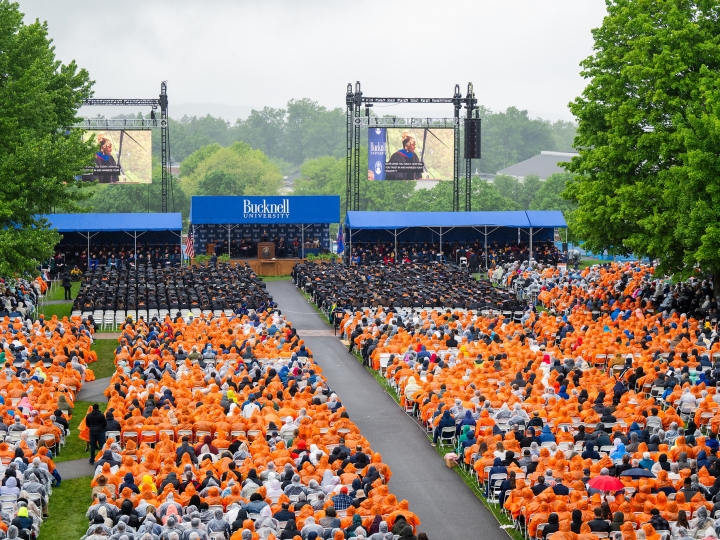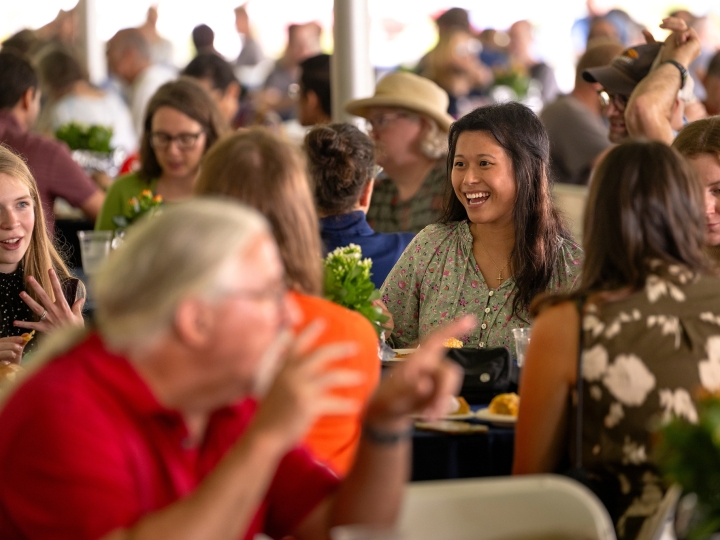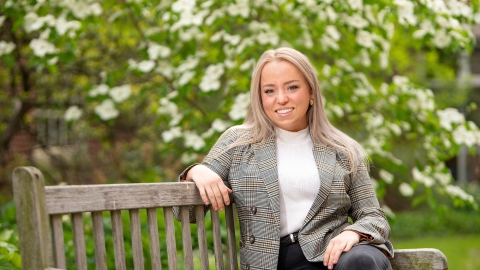
As Fulbright and Boren Scholars, These Bucknellians Will Take Their Curiosity Overseas
May 25, 2021
The baseball went up, and then it fell down.
Sara Butler '21 remembers watching this less-than-riveting demonstration of gravity during a class she took before transferring to Bucknell.
"Why would anyone need to know this?" she remembers thinking. "It's just observation."
The answer fell into Butler's lap once she started taking physics classes at Bucknell.
"When you take those tools and start figuring out things you can't observe, with quantum mechanics, that's cool," she says. "I just got chills thinking about it."
That curiosity about the universe's enduring mysteries inspired Butler to apply for — and receive — a Fulbright Award, which will fund her continuing research into quantum gravity this fall at the University of Vienna.
And she's not the only Bucknellian taking their curiosity to new and exciting places.
Over the next year, three students and three professors will bring their Bucknell experiences overseas through educational travel funded by the Fulbright Program and Boren Awards.
"Bucknell University is delighted to support our students and faculty in investigating their curiosities and pursuing their dreams all across the globe," says Margaret Marr, director of the Office of Undergraduate Fellowships and Research, which assists students in applying for prestigious fellowships and scholarships like Fulbright and Boren.
Here are the winners and where they're headed next.
Fulbright: Sara Butler ’21, Austria
Butler, a Maryland native who will graduate this year with degrees in physics and philosophy, transferred to Bucknell in 2019 after spending two years at the U.S. Air Force Academy in Colorado. She was medically discharged after being diagnosed with Type 1 diabetes.
Butler was pursuing a philosophy degree at the Air Force Academy and continued on that path when she arrived at Bucknell.
"I love philosophy because it seems to go after the questions that are important to me," she says. "No other questions have the same significance."
But before long, physics began to pull at her, too. While discussing the philosophical implications of quantum time travel, for example, she realized that "you have to bring physics into it."
So she added a physics major, and everything clicked into place.
"Philosophy gives me the motivation and the drive for these questions," she says. "But physics gives me the optimal toolkit."
Butler's work quickly gained outside attention, even earning her a Goldwater Scholarship in 2020. She was accepted into Yale's Ph.D. program to study high-energy physics but will defer until the end of her nine-month Fulbright research in Austria.
In Vienna, Butler will work with Markus Aspelmeyer, an accomplished quantum physicist who is studying whether gravity has a quantum description.
While anyone can watch gravity make an apple fall from a tree, scientists don't yet know how that invisible force interacts with the universe's smallest particles. After isolating all other variables, Butler and Aspelmeyer will examine those microscopic particles to see whether a gravitational force can be detected.
It's "high-risk, high-reward" work — a field where the answers always seem just out of reach.
"You could work your entire life on this kind of research without solving the problem," she says. "I don't expect to get results, but I do hope to have a greater sense of working within a group and knowing how to think like a scientist."
To help her prepare, she's received tremendous support from Bucknell faculty and staff, even getting coffee with a physics professor who shared insight on how to overcome "imposter syndrome" — the feeling of questioning whether you belong in a group.
"I feel like I'm not going alone," she says. "I'm bringing the entire physics department with me."
Boren Award: Susie Williams ’23, Kazakhstan
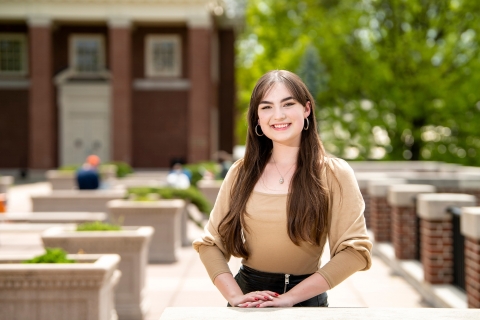
Thanks to the Boren Award, Susie Williams '23 will spend eight months in Kazakhstan studying Russian to prepare for a career in the foreign service. Photo by Emily Paine, Communications
Susie Williams '23 will never forget the first time she stepped into the office of Professor Oksana Willis, Russian studies.
Willis' shelves were filled with books written in Russian.
"I could not read any of the titles on the spines," Williams says. "It looked like total gibberish — not even comprehensible."
The literary studies and Russian studies double-major from Johnstown, Pa., had studied Spanish in high school. But she wanted to add an Eastern European language to her repertoire — not only for its attractiveness to future employers but also for her grandmother, who grew up in the Soviet Union and spoke five languages: Czech, Slovak, Russian, English and Hungarian.
After about two months of Russian classes, Williams returned to Willis' office. Suddenly, those Cyrillic characters didn't seem so foreign. It was like she had developed a new superpower.
"Going back, I realized I recognized all the titles: 'OK, there's Dostoevsky.' And I'm reading them," she says.
Williams is attracted to Russian because it's like a puzzle.
"You take a verb, and you're almost solving something," she says. "You have to make sure that every part of the sentence has the right puzzle piece and fits together."
Williams will add more pieces to the puzzle early next year thanks to funding from the Boren Awards, which support students who want to learn languages deemed critical to U.S. national security. In exchange for having their study abroad costs covered, students commit to one year of government service after earning their degree.
Williams will spend eight months in Kazakhstan studying Russian to prepare for a career in the foreign service. She hopes to come back with more than just a greater command of the Russian language.
"It's going to offer me perspectives that I never would have had otherwise," she says.
Boren Award: Cole Reish ’23, Latvia
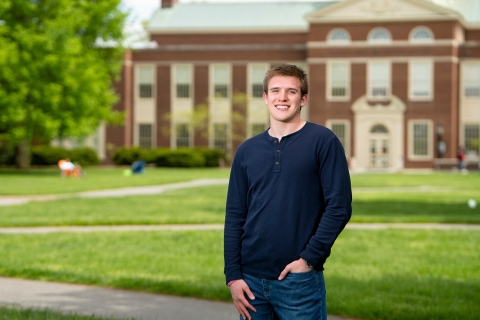
Cole Reish '23 received a William D. Clarke, Sr. Diplomatic Security Fellowship. Photo by Emily Paine, Marketing & Communications
As study-abroad locations go, Latvia trails far behind popular destinations like Italy, Spain or England.
For Cole Reish '23, a linguistics and Russian studies double-major from Mifflinburg, Pa., that's part of the appeal.
Entering Bucknell, he knew he wanted to study a critical language — one that's important to national security like Arabic, Chinese or Russian — to prepare him for a job in diplomacy.
"I have a very heavy interest in syntax — the mechanics of language," he says. "Just this idea that you can communicate, it opens your horizons to so many different things, and you get exposed to a completely new culture."
That's the plan for this fall when Reish travels more than 4,000 miles to the Baltic nation to continue learning Russian during a trip funded by his Boren Award. Though Latvia's official language is Latvian, Reish will study in the country's second-largest city, Daugavpils, which has a predominantly Russian-speaking population.
The trip to Latvia will be Reish's first time out of the country — and his first on an airplane — but he says he's ready.
"Growing up in a small town, I never really had opportunities like this," he says. "I really found a home with the Russian department at Bucknell, and I'm super grateful for all my professors. I really think they prepared me for this."
Fulbright: Professor Lara Dick, Cyprus
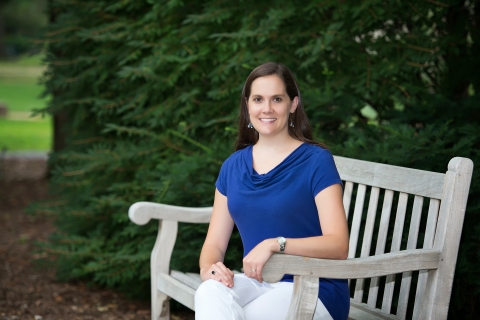
Professor Lara Dick, mathematics, will spend time in Cyprus studying how math students learn. Photo by Greg Lehr
Professor Lara Dick, mathematics, has received a Fulbright to travel to the island nation of Cyprus to continue her research on how math teachers can use technology to help students learn more effectively.
Her work includes analyzing "teacher noticing," the process by which teachers observe and learn from the ways in which their students learn.
"Much of my work has been focused on helping teachers move from attending and interpreting their students' thinking to using that information to make instructional decisions in their classrooms," she says.
When students engage with math using technology, teachers must effectively track their learning and make informed decisions about the next step.
Dick, who works with future teachers at Bucknell, will engage with practicing teachers in Cyprus. She hopes to uncover any differences between these two groups and the ways they develop noticing skills.
She's also curious about whether Cypriot students engage with math technologies differently from American ones. When she returns to Bucknell after the Fulbright, she'll come back with videos of Cypriot students that will be useful tools to prospective teachers at Bucknell.
Fulbright: Professor Nathan Ryan, Costa Rica
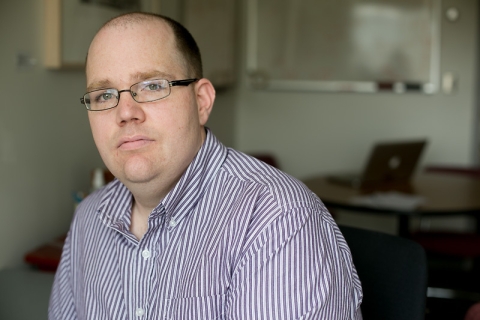
Professor Nathan Ryan, mathematics, will complete math research in Costa Rica — his third Fulbright after trips to Ecuador and Uruguay. Photo by Bill Cardoni
Professor Nathan Ryan, mathematics, will fly to Costa Rica to teach college-level computational mathematics, research number theory and collaborate on outreach projects to bring mathematics to local schoolchildren.
This is Ryan's third Fulbright; he traveled to Ecuador in 2017 and Uruguay in 2009.
While many mathematics equations can be solved by following the steps until you reach an answer, Ryan's work has no defined formula.
"Math research is different since it's not always clear where things are going when you start," he says. "My collaborator and I have a couple of projects in number theory that we're starting to think about."
In many ways, the work will be a continuation of research that Ryan has conducted with his students at Bucknell.
"I've worked with a lot of students, both in research projects and in classes with a significant project component," he says. "Both of those translate to the research and teaching I'll be doing in Costa Rica."
Fulbright: Professor Zhiqun Zhu, Australia
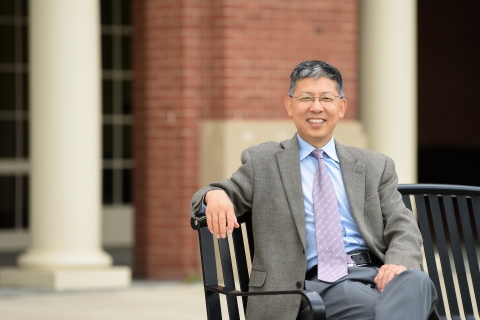
Professor Zhiqun Zhu, political science and international relations, will research how the rise of China is challenging the U.S-Australia alliance. Photo by Emily Paine, Communications
Professor Zhiqun Zhu, political science and international relations, will travel to Australia in the spring of 2022 to study that country's relationship with the United States in the context of China's rise as a global power.
China is Australia's largest trading partner, but the United States is Australia's primary guarantor of security. Countries like Australia, Israel and South Korea want to maintain good relationships with both China and the U.S. — even as each side applies political pressure.
"The Fulbright will help me expand my research to cover different dimensions — different areas where China's foreign policy will have an impact," he says.
Zhu will complete his research at Griffith University in Queensland, located in northeastern Australia. While there, he'll collaborate with other researchers and give talks to students and fellow academics.
When he returns to Bucknell, Zhu plans to incorporate what he's learned into his curriculum — ensuring that students have a complete, up-to-date picture of the global landscape.
